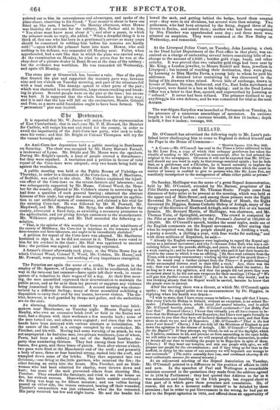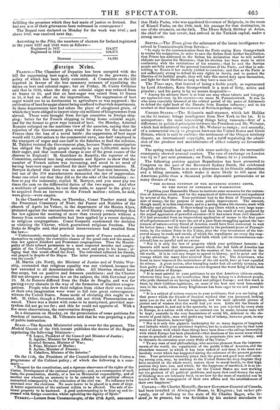IRELAND.
Mr. O'Connell has advertised the following reply to Mr. Lane's pub- lished letter challenging him to come to England to defend himself and the Pope in the House of Commons-
" Merrinn Square, 12th May 1843. "A CARD.—Mr. O'Connell has read in the Times a letter addressed totim by Mr. Lane Fox, a copy of which that unhappy gentleman has taken the trouble of sending to Mr. O'Connell in manuscript, after he had printed the original in the newspapers. Of course it will not be expected that Mr. O'Con- nell should say one word in reply to that strange maniacal epistle ; but he feels that, as a gentleman and a Christian, he is bound earnestly to implore the friends of Mr. Lane Fox to obtain for him that protection which the court in matter of lunacy is enabled to give to persons who, like Mr. Lane Fox, are manifestly incompetent to the management of affairs either public or private."
On Sunday, Mellinger was the scene of a great Repeal demonstration, held by Mr. O'Connell, attended by Mr. Barrett, proprietor of the
Pilot Dublin newspaper, and Mr. Thomas Steele. People came from
distances of forty miles to be present at the meeting, which was held at the upper end of Main Street ; and among those present were the Right Reverend Dr. Cantwell, Roman Catholic Bishop of Meath, the Right Reverend Dr. Higgins, Roman Catholic Bishop of Ardagh, many of the clergy of the dioceses of Meath and Ardagh, and some five or six hunred
farmers. Mr. Bernard Martin, of Mellinger, was chairman, and Atr. Thomas Tulle, of Springfold, secretary. The crowd is computed by- the Pilot at more than 100,000; by the Freeman's Journal at 120,000 or 130,000. Mr. O'Connell's speech, besides the usual topics, made use of the English comments on the Repeal movement. After stating that what he required was, that the people should pay "a farthing a week, a penny a month, a shilling a year, with four weeks for nothing," and with three millions of Repealers, he said- " Already the English newspapers were beginning to regard the Repeal agi- tation as a national movement ; and why ?—because John Bull, who was a cal- culating fellow, saw the pounds, shillings, and pence, the six or seven hundred a week coming in ; and he knew that the people who paid it had their hearts de- voted to the cause to which it was an offering. [He then read extracts from the Times, with a running commentary; winding up this part of his speech thus—] Well, he would read a further extract from the Times—' A people labouring under unexampled distress send in their 6001. a week.' Aye, there was the rub; that was what set calculating John Bull to think about the matter; for as long as it was a dry agitation, and that the people did not prove they were in earnest about it, he did not care twopence for their meetings. (Cries of" We will give him further reason to think.") Aye, to be sure they would; and he was thinking already that the Repeal would be carried, because he knew that the people were in earnest.
After the meeting there was a dinner, at which Mr. O'Connell again spoke ; but the signal point was an announcement by Dr. Higgins, in replying when his health was drunk— "I wish to state, that I have every reason to believe, I may add that I know, that every Catholic Bishop in Ireland, without an exception, is an ardent Re- pealer. (Enthusiastic cheers, which lasted for several minutes and in which Mr. O'Connell heartilyjoined.Mr. O'Connell exclaimed-4" :Let Bobby Peel hear that." Renewed cheers.) I know that virtually you all have reason to be- lieve that the Bishops of Ireland were Repealers; but I have now again formally to announce to you that they have all declared themselves as such, and that from shore to shore we are now all Repeaters. (Mr. O'Connell—. That is the best news I ever heard." Cheers.) I for one defy all the Ministers of England to put down the agitation in the diocese of Ardagh. (Mr. O'Connell—" Hurrah now for the Repeal r) If they attempt, my friend, to rob us of the daylight, which is, 1 believe, common to all, and prevent us from assembling in the open fields, we will retire to our chapels; and we will suspend all other instruction, in order to devote all our time to teaching the people to be Repealers in spite of them. (Cheers.) If they beset our temples, and mix our people with *pier, we will prepare our people for the circumstances ; and if they bring us for that to the scaffold, in dying for the cause of our country we will bequeath our wrongs to our successors.' (The entire assembly here rose, and continued cheering Ai the most enthusiastic manner for several minutes.)
At an adjourned meeting of the Repeal Association on Tuesday, Mr. O'Connell pointed to a difference in the position of affairs in 1834 and now. In the speeches of Peel and Wellington a remarkable omission occurred in the quotations they made from the address agreed to in 1834 by Parliament : they had quoted that Address so far tet it was minacious and insulting to the Irish people, but stopped short ht that part of it which gave them promises and consolation. He of course, did not for a moment suffer himself to be deluded by these promises ; but in order to pat Government in the wrong, he had put an end to the Repeal agitation in 1834, and offered them an opportunity Of fulfilling the promises which they had made of justice to Ireland. But had any o3e of their grievances been redressed in consequence ?
The Repeal rent declared on Monday for the week was 6941.; and above 100/. was received next day.
According to the Pilot, the numbers of electors for Ireland registered in the years 1837 and 1843 were as follows— Registered in 1837 124,277
Registered in 1843 109,975
Decrease 14,320



























 Previous page
Previous page